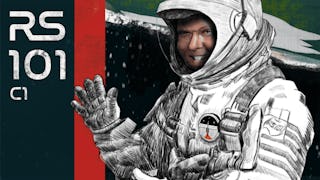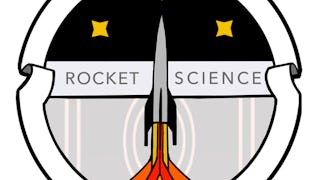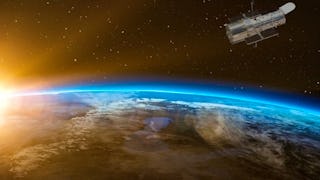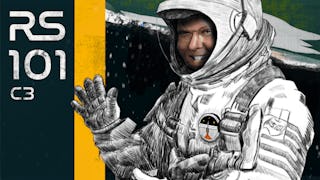Modern rocket design started amidst World War II, pushing the boundaries of what rocketry was capable of. In The History of Rocket Science, you’ll gain a deeper understanding of this complicated history and discuss key advancements, like the creation of the V2 rocket. Examine the ramifications of the advancements of rocket science from a historical and societal perspective, going beyond the technological advancements during the war. This course also explores the Cold War, culminating in the United States’ creation of the Apollo 11 — the pivotal creation that landed the U.S. on the moon. Round out the course by getting a first-hand look at space shuttles, space stations, space tourism, and how companies are opening up space exploration.


The History of Rocket Science
Dieser Kurs ist Teil von Spezialisierung für Rocket Science 101

Dozent: Aaron Ridley
Bei enthalten
(24 Bewertungen)
Empfohlene Erfahrung
Was Sie lernen werden
Describe the progression and the reasoning behind the US's Mercury, Gemini, and Apollo programs
Describe the costs and benefits of the space shuttle program, and why the US lost two shuttles
Describe how Germany developed rockets for warfare in WWII and how the US and USSR used this technology to develop their rocket programs
Kompetenzen, die Sie erwerben
- Kategorie: Emerging Technologies
- Kategorie: Political Sciences
- Kategorie: World History
- Kategorie: Timelines
- Kategorie: Innovation
- Kategorie: International Relations
- Kategorie: Engineering Design Process
- Kategorie: Manufacturing and Production
- Kategorie: Aerospace Basic Quality System Standards
Wichtige Details

Zu Ihrem LinkedIn-Profil hinzufügen
16 Aufgaben
Erfahren Sie, wie Mitarbeiter führender Unternehmen gefragte Kompetenzen erwerben.

Erweitern Sie Ihre Fachkenntnisse
- Lernen Sie neue Konzepte von Branchenexperten
- Gewinnen Sie ein Grundverständnis bestimmter Themen oder Tools
- Erwerben Sie berufsrelevante Kompetenzen durch praktische Projekte
- Erwerben Sie ein Berufszertifikat zur Vorlage

In diesem Kurs gibt es 4 Module
Welcome to the History of Rocket Science course and to Week 1: The Advent of Modern Rockets. This module will take you on a journey through the fascinating history of rocketry, beginning with the time before modern rockets existed and leading up to the post-WWII era. By the end of this module, you will be able to recognize what came before modern rockets, comprehend the cost of rocketry in WWII, and comprehend the development of rocket inventions in WWII in Germany. You will also be able to recognize how the US and USSR responded to post-WWII, setting a strong foundation for the rest of the course. Let's dive into the fascinating world of rocket science!
Das ist alles enthalten
4 Videos7 Lektüren3 Aufgaben2 Diskussionsthemen
Welcome to the second module of the History of Rocket Science course—Week 2: The Space Race. This module will take you on a thrilling journey through one of the most exciting periods in the history of rocketry—the space race. By the end of this module, you will be able to comprehend the political paradigm of the space race: communism vs. capitalism, recognize the USSR's early victories in the space race, identify the components of the US plan to get to the moon, and explain why the USSR plan failed to get to the moon. Join us as we relive the excitement and intrigue of the space race and gain a deeper understanding of the history of rocket science.
Das ist alles enthalten
8 Videos6 Lektüren5 Aufgaben
Welcome to the third module of the History of Rocket Science course—Week 3: The Space Shuttle Era. This module will explore the era of the Space Shuttle program, which marked a new phase in the history of space exploration. We will examine the evolution of the shuttle program and its impact on the exploration and utilization of space. The module will be divided into three parts, each focusing on a distinct aspect of the Space Shuttle era. The first part will cover Fast Airplanes, where we will explore the technological advancements that made high-speed aircraft and commercial space travel possible. The second part will focus on Space Stations, where we will examine the construction and operation of the International Space Station (ISS), which continues to be a vital platform for scientific research and technological development in space. Lastly, the third part will cover The Space Shuttle, where we will take a closer look at the cost and benefits of the shuttle program, including its role in deploying and repairing satellites, and its use in servicing the Hubble Space Telescope. Join us as we explore the exciting and innovative era of the Space Shuttle program and gain a deeper understanding of the history of rocket science.
Das ist alles enthalten
4 Videos4 Lektüren4 Aufgaben1 Diskussionsthema
Welcome to the fourth and the last module of the History of Rocket Science course—Week 4: The Industrial Revolution. In this module, we will explore how the rocket industry has been transformed by the rise of commercial space companies and the emergence of new space technologies. By the end of this module, you will be able to identify the reasons for the development of small satellites, recognize the cost model of launch vehicles, identify what launch vehicle providers are doing to drive costs down, and comprehend the motivation to go to Mars and how we can get there. Join us as we explore the cutting-edge technologies and revolutionary ideas that are driving the Industrial Revolution in rocket science, and gain a deeper understanding of the future of space exploration.
Das ist alles enthalten
5 Videos5 Lektüren4 Aufgaben1 Diskussionsthema
Erwerben Sie ein Karrierezertifikat.
Fügen Sie dieses Zeugnis Ihrem LinkedIn-Profil, Lebenslauf oder CV hinzu. Teilen Sie sie in Social Media und in Ihrer Leistungsbeurteilung.
Dozent

Mehr von Physics and Astronomy entdecken
 Status: Kostenloser Testzeitraum
Status: Kostenloser TestzeitraumUniversity of Michigan
 Status: Kostenloser Testzeitraum
Status: Kostenloser TestzeitraumUniversity of Michigan
 Status: Vorschau
Status: VorschauYale University
 Status: Kostenloser Testzeitraum
Status: Kostenloser TestzeitraumUniversity of Michigan
Warum entscheiden sich Menschen für Coursera für ihre Karriere?




Bewertungen von Lernenden
24 Bewertungen
- 5 stars
91,66 %
- 4 stars
8,33 %
- 3 stars
0 %
- 2 stars
0 %
- 1 star
0 %
Zeigt 3 von 24 an
Geprüft am 24. Juni 2024
Thank you, Dr. Aaron Ridley, for the incredibly well presented history of rocket science and space exploration. I enjoyed every single second of the course!

Neue Karrieremöglichkeiten mit Coursera Plus
Unbegrenzter Zugang zu 10,000+ Weltklasse-Kursen, praktischen Projekten und berufsqualifizierenden Zertifikatsprogrammen - alles in Ihrem Abonnement enthalten
Bringen Sie Ihre Karriere mit einem Online-Abschluss voran.
Erwerben Sie einen Abschluss von erstklassigen Universitäten – 100 % online
Schließen Sie sich mehr als 3.400 Unternehmen in aller Welt an, die sich für Coursera for Business entschieden haben.
Schulen Sie Ihre Mitarbeiter*innen, um sich in der digitalen Wirtschaft zu behaupten.
Häufig gestellte Fragen
To access the course materials, assignments and to earn a Certificate, you will need to purchase the Certificate experience when you enroll in a course. You can try a Free Trial instead, or apply for Financial Aid. The course may offer 'Full Course, No Certificate' instead. This option lets you see all course materials, submit required assessments, and get a final grade. This also means that you will not be able to purchase a Certificate experience.
When you enroll in the course, you get access to all of the courses in the Specialization, and you earn a certificate when you complete the work. Your electronic Certificate will be added to your Accomplishments page - from there, you can print your Certificate or add it to your LinkedIn profile.
Yes. In select learning programs, you can apply for financial aid or a scholarship if you can’t afford the enrollment fee. If fin aid or scholarship is available for your learning program selection, you’ll find a link to apply on the description page.
Weitere Fragen
Finanzielle Unterstützung verfügbar,

